Articles
Methodological guide of the hierarchical ecological networks
The pilot region Isère has published a guide presenting various experiences they led since ten years in different areas and the methods being used. The publication "Methodological guide of the hierarchical ecological networks - Ten years of experiments in Isère" is available in English and French.
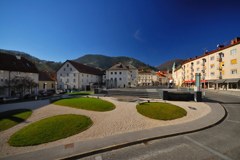
Idrija is the Alpine Town of the Year 2011
The label for sustainable development was awarded to the Slovenian town of Idrija for its commitment to climate protection among other initiatives. The "Alpine Town Year" was ceremoniously inaugurated in February.
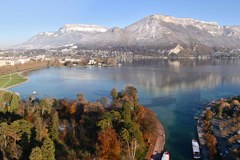
Olympic bid by Annecy: repercussions underestimated
French environmental protection agencies have said that the "impact of the Olympic Games on the environment are widely underestimated in the application documents".
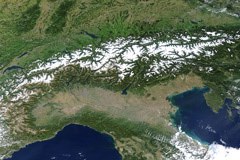
Publication: The Alps in 2010
The new publication titled The Alps by the Permanent Secretariat of the Alpine Convention provides a comprehensive overview of the Alps, including a wealth of cartographic material. For over a thousand years the Alpine landscape has been used as a cultural landscape.
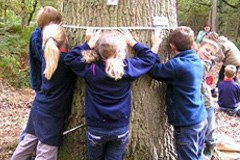
Network of municipalities: new approaches to climate change mitigation
Over the next two years twenty climate change mitigation projects are to be co-financed with around EUR 280,000 by the Alliance in the Alps local authority network. The strategies adopted by local authorities to deal with climate change vary greatly.
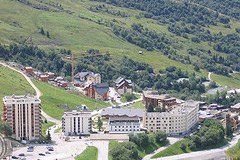
Publication: land management in mountain areas
The current issue of the bilingual Journal of alpine research is running a feature on land management. It is a subject on which scientific research is sparse, even though it is of increasing concern for Alpine local authorities.
Powerline poles: a serious danger for the eagle-owl
Whereas populations of eagle-owl in many parts of Europe slightly increase, they stagnate or slightly reduce in Switzerland. The situation is especially critical in Valais, where only approximately ten breeding pairs are living. In the last twenty years this population has barely changed. According to a new study only ten percent of eagle-owls in Valais survive the first year of their lives. One fourth dies of electric shock when trying to sit on obsolete powerline poles, which do not correspond to current security standards.
Wild cat back in Austrian forests
After more than fifty years, the wild cat returned to Austrian forests. To contribute to protection and a better acceptance of this shy animal among people, the Platform on Wildcats was founded in 2009.
Journal "Conservation Biology" about ecological connectivity and corridors
The April 2010 virtual issue of the journal Conservation biology contains several articles on connectivity and corridors.The articles address phenomena and actions that affect movement of genes, organisms (including humans), and ecological processes.
TransEcoNet: Comprehensive inventory of ecological networks in Central Europe finished
The TransEcoNet project strives for a better connection of protected and less or unprotected landscapes across national borders in Central Europe. One focus of the project during its first half of implementation has been the analysis of existing transboundary ecological networks, their status of biodiversity and the detection of gaps in these networks.
Fragmentation of Stelvio National Park management
A committee composed of members of the Italian government, the region Lombardy and the automous provinces of Trento and Bolzano has decided that the Stelvio national park/I should be run directly by local authorities. It foresees that the park will be managed by the Autonomous Provinces of Trento and Bolzano and the Region Lombardy, in collaboration with the municipalities concerned. According to WWF Italy, this could lead to an unnecessary and potentially damaging administrational fragmentation of the Park.
Renewed website Ecological Networks in the European Alps
The Ecological Continuum Initiative has launched its renewed webpage. Apart from the new appealing graphic design the website is also richer in information in German, French, Italian and Slovenian language such as publications, links, events and news. Therefore the website is more attractive for a wide public.
"The Wall": Less barriers, more life!
Stop - no way through! On 20th of October 2010 a giant wall blocked the way of pedestrians in Zurich/CH, Vienna/A, Munich/D, Ljubljana/SI, Milan/I and Lyon/F. For animals, it's the same every day: streets and settlements increasingly fragment their migration routes.
Dear colleagues and friends of the Ecological Continuum Initiative,
The international year of biodiversity is coming to an end. 2010 represented a unique opportunity to highlight the importance of biodiversity conservation. The topic had a large echo in the media, thanks to numerous events, new publications, TV reports etc. The year was also fruitful for ecological connectivity - a not so simple topic that received unprecedented media attention. In 2010 the Ecological Continuum Initiative's main focus was on communication. Many articles were published in specialized media. However our main achievement was "The Wall" event. Its aim was to bring home our message on the need for ecological connectivity, carrying it across the whole Alpine space, across administrative, language and cultural boundaries. We succeeded. Pedestrians in six Alpine cities were confronted with a big barrier blocking their paths: an obstacle much like those encountered by animals and plants every day. The public had therefore a chance to experience first hand the problem of habitat fragmentation. The event attracted the attention of local and national media in the Alpine countries. Thanks to "The Wall" the topic of ecological connectivity has reached many more people than is normally the case for such "technical" subjects. It is an important achievement in which we intend to build further awareness-raising initiatives.
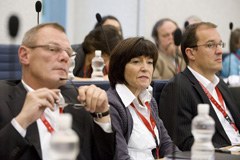
A media house for the Alps
The Alps are to have their own multilingual media platform. This ambitious idea was launched by the Rhaeto-Romanic department of Switzerland's public radio broadcaster. Las-Alps-Infoteca is to become "a competence centre for media in the Alps, providing news and information from the Alps and about the Alps".
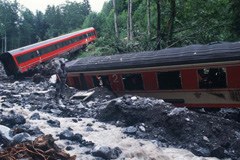
Natural hazards: an incalculable risk for road and rail?
Time and time again avalanches, debris-flows and rock falls result in roads being blocked and railway tracks being swept away, causing fatalities. The Alpine Space Project PARAmount is looking to bridge the gap between society's demands on transportation routes and the outline conditions defined by nature.
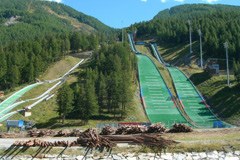
Olympic Games: no benefit to the national economy
Switzerland is once again discussing its candidacy for the 2022 Winter Olympics. Environmental organisations are warning against the ecological and economic repercussions. Even Marco Blatter, former CEO of Swiss Olympic, has been quoted on Swiss radio, saying that he was glad the 2006 Games were not held in the Valais. He added that in Turin/I the Games had grown out of all proportion. "With all the infrastructure investments Turin cost around CHF 4.5 bn; Vancouver is costing around CHF 6 bn; and Sochi 2014 is officially budgeting for CHF 13 bn," reports Switzerland's SonntagsZeitung.

Biodiversity in times of climate change: management or wilderness?
The concrete impact of climate change on biodiversity is still uncertain. However it is expected to be visible particularly in the behaviour of the flora and fauna in the Alps and also to be different for each species. The habitat of butterflies such as the marbled ringlet (Erebia montana) is set to shrink, alike the grouse's. But in a different way, because the grouse is more severely impacted by land use than by climate change.
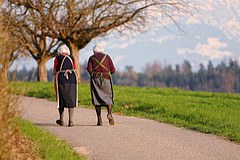
Conference on demographic change in the Alpine region
The Alpine Space Forum, to be held in Innsbruck/A from 22 to 23 February 2011, focuses on coping with demographic change in the Alpine region. The Alps are particularly affected as settlement areas are limited and many Alpine communities are located in the peripheries.
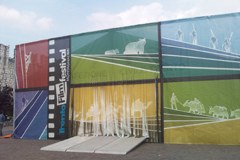
MontagnaLibri is looking for books on mountains
Preparations for the 2011 international mountain book fair MontagnaLibri are well underway. Authors and publishers are now invited to submit any books, magazines or studies published between 2007 and 2010.
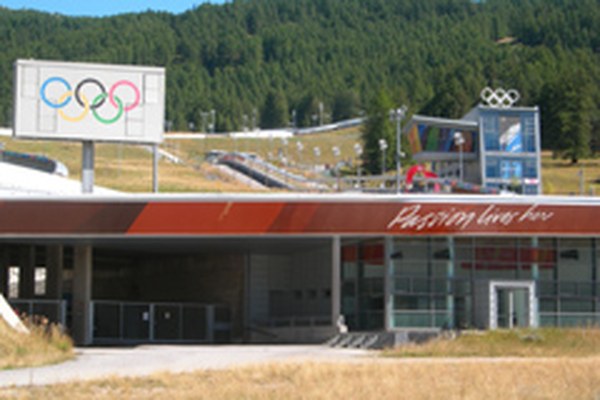
The shreds of Turin
Mountain regions are footing the bill for the Winter Olympics - the Winter Olympics bring fame and glory and an economic revival to the regions. For a fortnight. Leaving behind an oversized infrastructure, debts and empty beds. That, in a nutshell, is Turin four years after the 20th Olympic Winter Games.
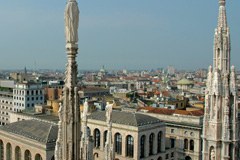
ForumAlpinum 2010: proceedings now online
The 9th edition of the ForumAlpinum was held in Munich/D in early October. Titled Metropolises and "their" Alps it explored from scientific and political angles the relationship between the Alps and large cities along the Alpine Arc Further on the plenary talks and workshops focused on the relations between large cities and climate change, biodiversity, geo risks, and the European macro-region "Alpine Space".

Legal barriers and potentials for a pan-Alpine ecological network
A synthesis report from the international technical seminar in the frame of the "legal barrier" work package of Econnect, which took place on 6 May in Grenoble/F, is now available. In the focus of the seminar was the question "How can legal instruments contribute to the objectives of ecological connectivity in the Alps?".
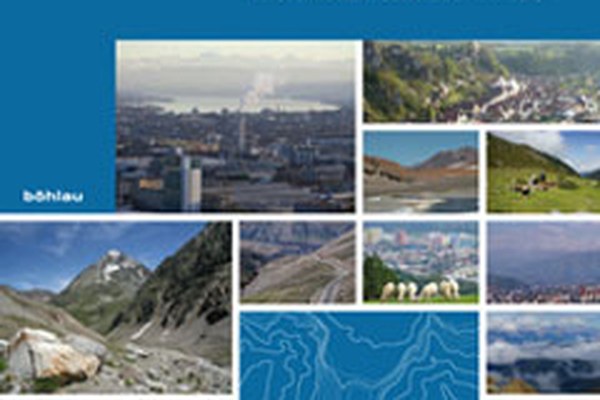
Publication on the challenges facing mountain regions
The Institute for Mountain Research at Innsbruck University/A has published a book on man and the environment in mountain areas under the English original title Challenges for Mountain Regions - Tackling Complexity. Besides the Alps it also examines mountain areas in the Andes and Patagonia.

cc.alps showcases future mobility in the Alps
In September CIPRA focused on the issue of sustainable mobility and transport as part of cc.alps and co-organised two events on these topics.
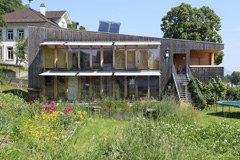
climalp video: living in a plus-energy house
CIPRA's climalp project demonstrates that energy-efficient houses built using regionally sourced timber are highly beneficial when it comes to living comfort, the climate, and the regional economy. A recent video featuring the single-family home of the Götz family built in Switzerland's Rhine valley in 2004 illustrates what sustainable, climate-friendly building can look like in practice.

Power plant expansion on the Lech at the expense of nature conservation?
The Lech river in Bavaria/D is already being used on a massive scale for electricity generation, and only the stretch at Augsburg/D remains undeveloped. But even this section of the river could very soon become the site of a hydroelectric power plant. The expansion plans are not an isolated case; rather, they reflect a trend throughout the Alps, and one that is gathering momentum.
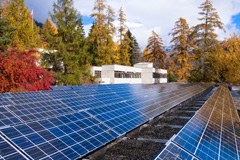
Background report on "Energy Self-sufficient Regions" now online!
The latest cc.alps background report is the compact on "Energy Self-sufficient Regions". It is dedicated to this topical, future-oriented issue and takes an in-depth look at the ambitious concept and its conflicts of objectives.
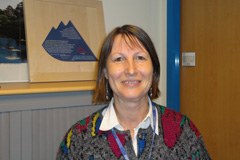
Calm and collected in a heated discussion: Pascale Poblet, CCP Project Manager "There's no stress involved in travelling by bus or by bike."
With a commuter plan that encourages the use of modes of transport other than cars the STMicroelectronics and ST-Ericsson site in Grenoble/F is committed to eco- and climate-friendly mobility. For this initiative the company was awarded one of the cc.alps competition prizes worth 10,000 euros. Pascale Poblet, CCP (Company Commuter Plan) Project Manager, explains why the company's workforce is in such great shape and why the company's kitty has benefited as a result.
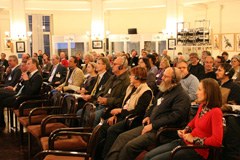
CIPRA Yearly Symposium 2010: "The Alps Adapting to Change"
CIPRA's 54th Yearly Symposium was held in Semmering/A (14-16 October 2010) to the motto of "The Alps Adapting to Change - Peripheral Regions Between Wasteland and Hope". It clearly showed that decision-makers are only now beginning to perceive the problems remote areas within the Alps are faced with. Unsurprisingly there were no patent remedies to the problems these areas have to contend with - indeed the circumstances and claims to exploitation in individual regions of the Alps are far too diverse and need to be countered in just as many ways. What remains is a need for debate and action for a sustainable, future-orientated development of peripheral rural regions in the Alps.